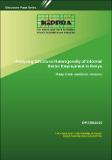| dc.description.abstract | The informal sector accounts for 83 per cent of the total employment in Kenya.
This study sought to understand duality and its driving factors to inform policy
on enhancing decent work in the informal sector in Kenya. Using a multinomial
logit analysis, the study established that workers are motivated to engage in more
than one job in the informal sector due to its structure, to get more earnings and
to meet the standard of living. Indeed, employees with low skills, less income and
those residing in rural areas are likely to have two jobs in the informal sector.
Further, workers in formal full time employment are less likely to engage in duality
compared to their counterparts who have no employment contract. Women and
youth are more likely than men to work on multiple jobs in the informal sector. The
key recommendations include implementation of policies and strategies to improve
terms of employment in the informal sector; sensitization of workers and employers
and development of regulations to foster participation of informal sector workers
in trade unions; and improve access to post-skills training, in service training,
recognition and certification of prior learning and apprenticeship among informal
sector workers. It is also important to increase job creation in the formal sector;
and improve official data, statistics, and documentation of informal sector. It is
important that the government, with support from the private sector, improves the
productivity of the informal sector with a well-balanced mix of economic and social
policies that will make a remarkable contribution to enhancing quality of informal
sector jobs. There is also need for policies that will protect women against social risks
and vulnerabilities, such as unemployment, potential lay-off during maternity, old
age, and ill health. There is need for the government with support from stakeholders
to create more innovative opportunities and give incentives to private providers of
employment services while improving the quality of jobs in the informal sector. | en |

